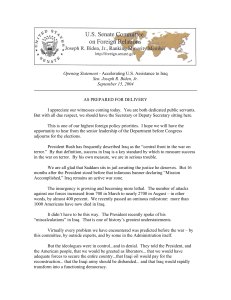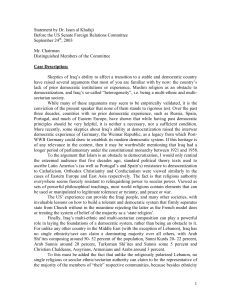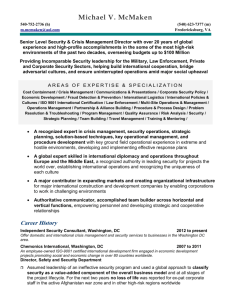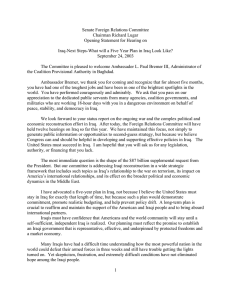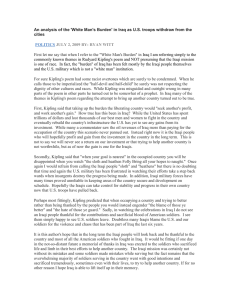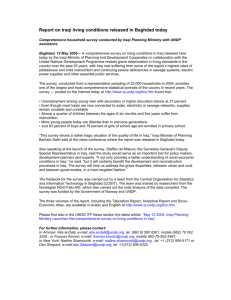Ronald L. Schlicher, Iraq Coordinator September 15, 2004
advertisement
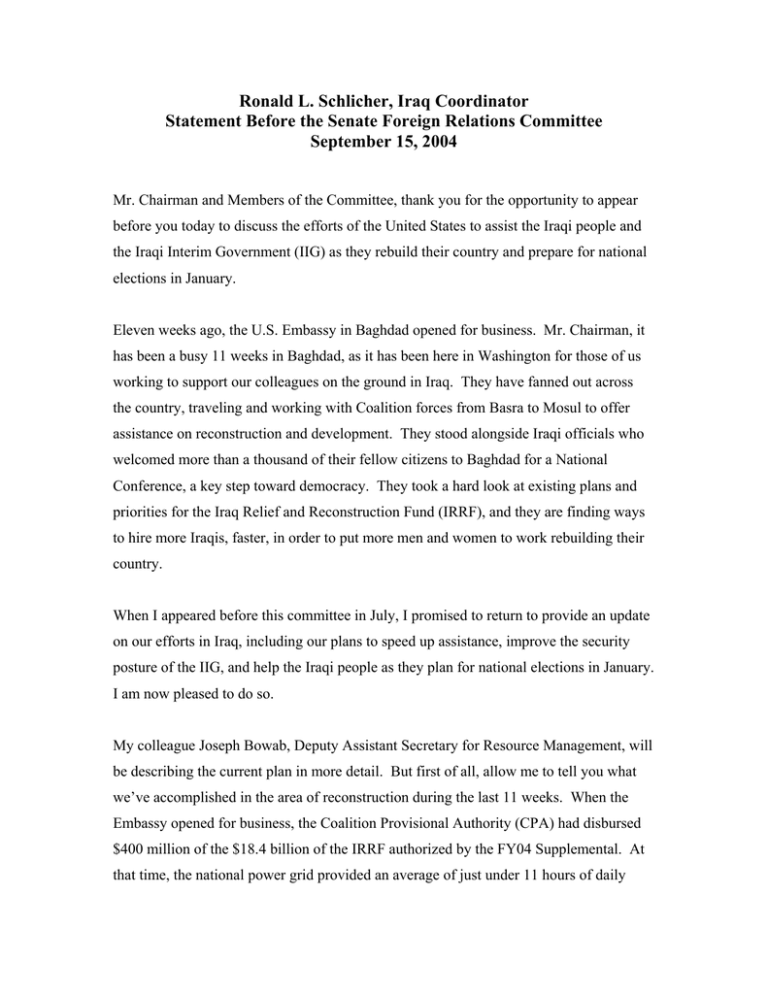
Ronald L. Schlicher, Iraq Coordinator Statement Before the Senate Foreign Relations Committee September 15, 2004 Mr. Chairman and Members of the Committee, thank you for the opportunity to appear before you today to discuss the efforts of the United States to assist the Iraqi people and the Iraqi Interim Government (IIG) as they rebuild their country and prepare for national elections in January. Eleven weeks ago, the U.S. Embassy in Baghdad opened for business. Mr. Chairman, it has been a busy 11 weeks in Baghdad, as it has been here in Washington for those of us working to support our colleagues on the ground in Iraq. They have fanned out across the country, traveling and working with Coalition forces from Basra to Mosul to offer assistance on reconstruction and development. They stood alongside Iraqi officials who welcomed more than a thousand of their fellow citizens to Baghdad for a National Conference, a key step toward democracy. They took a hard look at existing plans and priorities for the Iraq Relief and Reconstruction Fund (IRRF), and they are finding ways to hire more Iraqis, faster, in order to put more men and women to work rebuilding their country. When I appeared before this committee in July, I promised to return to provide an update on our efforts in Iraq, including our plans to speed up assistance, improve the security posture of the IIG, and help the Iraqi people as they plan for national elections in January. I am now pleased to do so. My colleague Joseph Bowab, Deputy Assistant Secretary for Resource Management, will be describing the current plan in more detail. But first of all, allow me to tell you what we’ve accomplished in the area of reconstruction during the last 11 weeks. When the Embassy opened for business, the Coalition Provisional Authority (CPA) had disbursed $400 million of the $18.4 billion of the IRRF authorized by the FY04 Supplemental. At that time, the national power grid provided an average of just under 11 hours of daily power throughout Iraq, while on average oil production remained just short of prewar levels. We can take justifiable pride in our progress since then. Now more than 111,000 Iraqis have been employed in USG-managed projects – not to mention Iraqis previously employed by projects funded by the Development Fund for Iraq – and disbursement of IRRF monies has surpassed $1 billion, more than double the amount on July 1. This is still too low, however; we need to keep pressing ahead on disbursement. More Iraqis have access to sewer service and clean drinking water, and more people outside of Baghdad are getting electricity. Since the handover on June 28, electricity generation has grown by 10 percent and consistently exceeds 110,000 MW hours of power each day, despite the frequent attacks on the electricity grid that lead to outages such as that of September 14. In addition, despite the repeated attempts of terrorists to disrupt oil production and exports, oil production is at the highest level since the beginning of the war, and last Friday, exports reached a post-war peak of 2 million barrels a day. With the additional investment in oil infrastructure we anticipate in the coming months, Iraq should have even greater capacity to increase oil production. Much of that progress is due to the groundwork laid by CPA. But as the Iraqi Interim Government assumed control of the country, and our new team in Baghdad geared up under the leadership of Ambassador Negroponte and General Casey, we felt it important to take a look at the existing priorities and circumstances on the ground to ensure that we are putting the money to use as quickly as possible in the ways most needed, according to our team’s analysis of the evolving needs on the ground. Over six weeks the entire Country Team worked to come to a consensus on the most urgent programs and the required funding levels. Ambassador Negroponte also consulted extensively with the Iraqi Interim Government to ensure that the Iraqis fully understand these priorities. Our proposed revisions to IRRF spending address the need to improve security, a key to all reconstruction efforts, while devoting additional resources to improving the economic and political environment in advance of the elections, including job creation. The shifts will require commensurate cuts in the important sectors of water, sanitation and electricity, and, as a result, we will not meet our previous targets in these areas in the same time frame. A primary consideration in the review was security. Violence, and the threat of violence, has slowed down the rate of progress on reconstruction. Projects throughout Iraq have suffered from attacks by insurgents who are terrorizing cities and villages. The largest single increase in spending we propose – $1.8 billion – will go for security and law enforcement, such as hiring more police, border guards, and soldiers. But there must also be political and economic components to defeating the insurgents. We seek a comprehensive approach to all these needs, though we know that the provision of adequate security is requisite to rapid progress on all other fronts. In short, one of our main weapons against the insurgents is hope. When Iraqis have hope for the future and real opportunities, they reject those who advocate violence. And nothing makes for faith in the future like a good job. We plan to put hundreds of thousands of Iraqis to work, creating perhaps more than 800,000 short- and long-term jobs over the next two years. Additionally, USG programs should spur employment in the Iraqi private sector. The bulk of new employment would be short-term jobs, many of one-month duration in community development projects. Others will be longer-term jobs in the security services, which our assistance makes possible through the provision of training and equipment. Understanding that the only way to generate good long-term employment is by the broad-based growth of a vibrant, free-market economy, in the near-term, we believe that the projects and priorities identified by our review will provide a quick impact on local communities, will demonstrate the tangible benefits of peace and stability, and will offer hope to people who have suffered for years without it. We also intend to help finance debt relief, which is important for Iraq for several reasons: it will free the resources that a democratic Iraq needs to rebuild its infrastructure, its schools, its hospitals and its economy to the benefit of the Iraqi people; it will remove a gigantic debt overhang that otherwise would hinder Iraq's attempts to foster investor interest in Iraq and the country's integration into the world economy; and our relatively small budgetary outlay will leverage much larger levels of debt relief from Iraq's other creditors. The emphasis on these priorities will mean we have less to spend on large-scale infrastructure projects such as sewage treatment plants and power plants. Projects in these sectors that were scheduled to begin in 2005 will be delayed, which unfortunately means fewer Iraqis will have these essential services by 2007 than we had originally intended. We have not forgotten these worthwhile plans, and we believe that other donors, and the Iraqis themselves, will find money for them. But we have heard from those on the ground in Iraq, as we have heard from you here in Washington, that we need to focus on projects that will make an immediate impact. We are focused on one deadline in particular, and that is the date for the national elections, January 31, 2005. The Independent Electoral Commission of Iraq (IECI) is now working closely with the United Nations to ensure that the elections are legitimate and credible, and that all eligible Iraqi voters have the opportunity to cast a ballot. We have monitored the progress of the IECI to organize these unprecedented elections in a daunting security environment under what is, without question, an ambitious timeframe. Despite those challenges, we are confident that they will succeed. With the assistance of a team of UN elections experts on the ground in Baghdad, they have begun to pull together a voter registration system, design a public information campaign, and complete election rules and procedures. We have provided support along the way and allocated $40 million from USAID to an NGO to assist in the logistical preparations for the elections. The IIG and MNF-I are working towards a security plan to ensure that voting is possible nationwide. We are committed to helping the IECI hold elections by January. We know that some expect the elections to fall behind schedule, or doubt they will be held at all. The Iraqis confronted similar doubts in the weeks before the opening of the National Conference this summer. Indeed it was reasonable to wonder, only a few weeks after the transfer of authority, whether a thousand Iraqis representing the wide spectrum of ethnic and religious groups could come together from all parts of the country to debate their nation’s future in a peaceful conference in Baghdad. Mr. Chairman, you may remember early press reports about the conference proclaiming that it was dissolving in acrimony. In fact, delegates to the National Conference ignored mortar rounds that fell nearby on the first day, engaged in heated – but peaceful – debate on a wide range of issues of concern to ordinary Iraqis, and insisted that the Conference be extended an extra day to accommodate debates over the election of the Interim National Council and resolutions on security, governance, human rights and reconstruction. The Conference’s Security Committee called for disbanding militias, for instance, while the Reconstruction Committee urged that projects rely more on Iraqi industries and create more Iraqi jobs. The Conference completed its most prominent task by approving a slate of delegates to sit on the Interim National Council, which has already started to meet in Baghdad and expand the range of participation in Iraqi politics. Perhaps the finest hour of the National Conference was on its second day, when members took the initiative to dispatch a delegation to Najaf to support the IIG’s efforts to peacefully resolve the standoff with the militia of Moqtada al-Sadr. The delegates did not call for compromise with al-Sadr, they did not urge the government to back down; rather, they explicitly sought what the residents of Najaf desperately wanted: an end to the fighting; a disarming of the militia; and a return of the shrines to the control of the legitimate religious authority. It was a wholly Iraqi endeavor, backed up by the security assistance of Coalition forces, and it ultimately contributed to the resolution of the standoff. We commend the delegates for their courageous initiative and the IIG for its patience, restraint, and resolve in reaching a peaceful solution, and we are determined to assist it to rush reconstruction aid to the battered city. Likewise we support Prime Minister Allawi’s efforts to reach out to cities and disaffected constituencies in the Sunni community in order to bring all Iraqis into the political process. We believe the IIG’s even-handed approach to Najaf may serve as a model to resolving conflicts with armed opposition elsewhere in the country, just as the strong performance of Iraqi security forces will give them confidence in confronting other armed aggression. In Najaf, Iraqi Army Special Operations Forces – along with Iraqi Intervention Forces, National Guard, and Police – fought well alongside Coalition forces. The Iraqi forces were instrumental in setting conditions for the withdrawal of al-Sadr’s militia and the preservation of the Imam Ali Shrine. And while Multi-National Force-Iraq provided extensive military and logistical support, the IIG was in charge throughout the standoff. The Iraqi people have been anxious for such a demonstration of resolve by their government. As we discussed in July, they have made clear that security is their top priority. They want what we all want – safe streets, peaceful neighborhoods, freedom from fear. The IIG has responded to their concerns, and now every day, more and more police are on the street, helping to stabilize and secure Iraq. As a result of ongoing assessments of the needs for security officials, we have increased the number of police we will train by one third, to a total of 135,000. Likewise, in consultation with the IIG, we have doubled the number of border forces we intend to train to 32,000. The border is now better patrolled every day, limiting the number of foreign fighters slipping into Iraq. We expect that NATO will soon be contributing to the readiness of Iraqi security forces. The NATO Training Implementation Team assessment is complete, and in fact its report is scheduled to be delivered to the North Atlantic Council today. Proposed training missions for NATO include helping to establish staff colleges and an Iraqi training command, coordinating professional military education to be conducted in NATO countries, and advising Ministry of Defense and Joint Headquarters officials. The international community continues to make other significant contributions to rebuilding and securing Iraq. In addition to the United States, the Coalition includes more than 30 countries contributing 23,000 personnel. We are working with the UN and the IIG on calling upon members of the international community to provide financing aor troop contributions to protect the UN in Iraq, as called for in UNSCR 1546, to enable the UN to carry out its leading role in advising and assisting Iraqis with elections and in carrying out humanitarian, economic reconstruction and other activities. A joint StateDoD team is heading to Romania, Ukraine, Georgia, and Azerbaijan to discuss potential contributions to a force to protect the Untied Nations. Meanwhile, the United Nations has hired two inner-ring security teams from Fiji that are scheduled to be on the ground in Iraq on Oct. 7. European Union Foreign Ministers have indicated a willingness to offer support for elections, help build infrastructure, strengthen the rule of law, and train police or military forces. Bringing these efforts to fruition will require much hard work on our part and the part of our allies, but we will see it through. We will consult extensively with members of the international community next week during the upcoming session of the UN General Assembly. We look forward to meeting with other donor nations in Tokyo in October to coordinate our assistance to the Iraqi people. Mr. Chairman, I heard from Members of this committee in July that you are troubled by the situation in Iraq. We are also. We grieve for our losses and for the death of all Iraqi innocents. We are troubled that Iraqis, who suffered for decades under an oppressive government that decimated their society, have yet to fully enjoy the fruits of democracy and stability. But with our help, Mr. Chairman, they will. They will build a new Iraq on the basis of respect for human rights, the rule of law, and a vibrant and free economy, an Iraq that is a model of democracy in the region and a responsible member of the international community. It is a monumental undertaking, but they do not despair. And we will not let them down. We must not. We know that a stable, democratic Iraq will make for a safer United States. As President Bush said recently, “Free societies are peaceful societies. Someday, an American President will be talking to a duly-elected leader of Iraq, talking about the peace, and America will be better for it.” Mr. Chairman and Members of the Committee, thank-you again for the opportunity to testify about our progress in Iraq. I look forward to answering any questions you may have.

